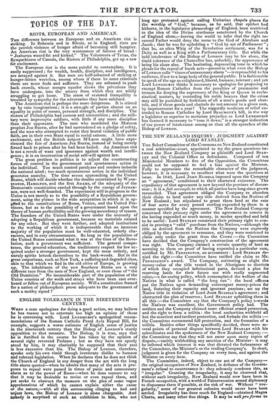ENGLISH TOLERANCE IN THE NINETEENTH CENTURY.
WHEN a man apologizes for doing a good action, we may believe he has reason not to entertain too high an opinion of those he is conversing with. Lord LYNDHURST'S apologetical recom- mendations of the Roman Catholic Penal Acts Repeal Bill, for example, suggests a worse estimate of English sense of justice in the nineteenth century than the Bishop of LoNnoN's sturdy opposition to that measure. The Bishop, it is true, says that be is fortified in the course he has taken by the opinion of several right reverend Prelates ; but as they have not openly stood by him, it may charitably be supposed that their zeal is less excessive than his. The Bishop of LONDON, therefore, speaks only his own timid though inveterate dislike to humane and tolerant legislation. When he declares that he does not think the Church of England in any danger from the act with the long title above quoted—when he admits that many of the acts it pro- poses to repeal were passed in times of panic and unnecessary alarm as to the power of Rome—when he does venture to say that it may be desirable to revise or even repeal them, and yet seeks to obstruct the measure on the plea of some vague apprehensions of which be cannot explain either the cause or the nature,—with all this unreasoning clinging to bad and unjust laws, the Bishop of LONDON is alone chargeable. And nobody is surprised at such an exhibition in him, who not long ago protested against calling Unitarian Chapels places for the worship of " God," because, as he said, that epithet had hitherto, in the legislative phraseology of England, been restricted to the idea of the Divine attributes sanctioned by the Church of England alone,—leaving the world to infer that the right re- verend Father would deny the name to the God of Abraham and Jacob ; that he was for upholding a " God by act of Parliament "; that he, an ultra Whig of the Revolution settlement, was for a Deity as well as a King with a Parliamentary title. But while the bold intolerance of the Bishop of LONDON may be his alone, the timid tolerance of the Chancellor has, unluckily, the appearance of being his alone also. The hesitating, deprecating tone in which he pleads for the repeal of harsh acts—passed in what even the Bishop of LONDON calls "times of unnecessary alarm "—is reproachful to his audience, if not to a large body of the general public. It is fashionable to speak of the age as enlightened, liberal, humane, tolerant ; and yet Lord LYNDHURST thinks it necessary to apologize for proposing to exempt Roman Catholics from the penalties of prMmunire and treason for denying the supremacy of the King or Queen in eccle- siastical matters, by reminding his noble hearers that the crime may still be punished by forfeiture of all a man's goods and chat- tels, and if these goods and chattels do not amount to a given sum, by imprisonment for a year ! The niggardly modicum of relief ex- tended to Roman Catholics by Lord BEAUMONT'S bill, in the way a legislator so superior to sectarian prejudice as Lord LYNDHURST has deemed it necessary to "tone it down," is a stronger indication of the power of intolerance among us than all the speeches of the Bishop of LONDON.


























 Previous page
Previous page